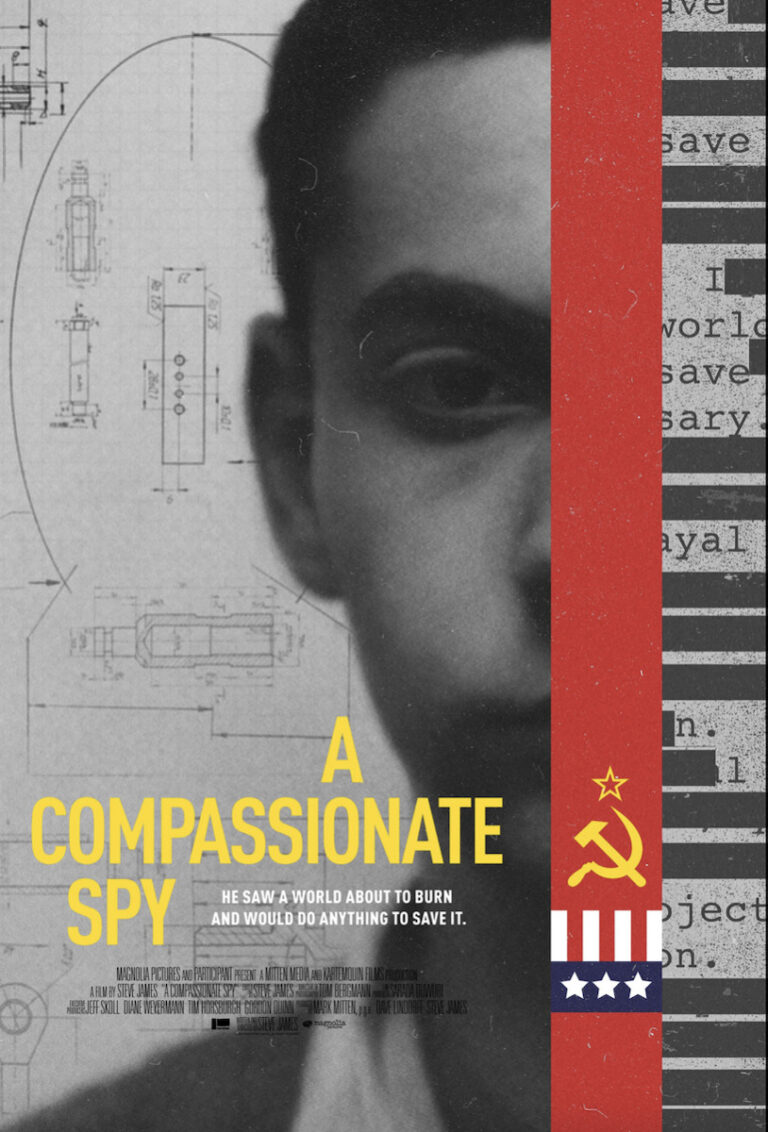
Synopsis : Directed by two-time Oscar® nominated filmmaker Steve James (HOOP DREAMS, LIFE ITSELF), A COMPASSIONATE SPY is a gripping real-life spy thriller about controversial Manhattan Project physicist Ted Hall, who infamously provided nuclear secrets to the Soviet Union, told through the perspective of his loving wife Joan, who protected his secret for decades. Recruited in 1944 as an 18-year-old Harvard undergraduate to help Robert Oppenheimer and his team create a bomb, Hall was the youngest physicist on the Manhattan Project, and didn’t share his colleagues’ elation after the successful detonation of the world’s first atomic bomb. Concerned that a U.S. post-war monopoly on such a powerful weapon could lead to nuclear catastrophe, Hall began passing key information about the bomb’s construction to the Soviet Union. After the war, he met, fell in love with, and married Joan, a fellow student with whom he shared a passion for classical music and socialist causes — and the explosive secret of his espionage. The pair raised a family while living under a cloud of suspicion and years of FBI surveillance and intimidation. A COMPASSIONATE SPY reveals the twists and turns of this real-life spy story, its profound impact on nuclear history, and the couple’s remarkable love and life together during more than 50 years of marriage.
Genre: Documentary, Biography, History
Original Language: English
Director: Steve James
Producer: Mark Mitten, David Lindorff, Steve James
Writer: Steve James
Release Date (Theaters): Limited
Release Date (Streaming):
Runtime:
Distributor: Magnolia Pictures
Production Co: Kartemquin Films, Participant, Mitten Media

Exclusive Interview with Director Steve James
Q: Compared to Robert Oppenheimer, Ted Hall was lesser known, but he was the youngest physician on the Manhattan Project. How did you decide to tackle this subject matter? You started on this project prior to the Christopher Nolan movie, right?
S.J: We started before [Nolan], back in 2019. I didn’t know anything about Ted Hall. I wasn’t looking into a film about nuclear war or the history but Ted’s story was brought to my attention by producer, Dave Lindor, a journalist who had written about Ted. He had met his wife and, in meeting her, said, “I think there’s a really important film that could be made here.” Dave reached out to me and Mark Mitton, the other producer and one thing led to another, and here we are, we made the film.
We spent several days with Joan, Ted’s widow, the wife who survived him. She passed away about a month ago. It was such an extraordinary and important story to be told that we dove in. In this country, there is such a limited understanding of what happened during World War II. We always have this impression that the US just came in and won the war — that we were the heroes of World War II — even though we entered the war quite late. Yes, we had a profound impact, but we didn’t just win the war by ourselves.
What happened in Hiroshima and Nagasaki, I think there’s been a tendency on the part of the American people and many American historians to just say that it was a necessary thing that had to be done. Of course, there has been a huge debate since it happened all those years ago. So this story is a way of getting at all of that, but through this very personal story of this one man, Ted Hall.
Q: Ted told his soon-to-be wife, Joan, everything about what was happening in Los Alamos, even talking about the passing of key information about the atomic bomb to the Soviet Union. But Joan accepted his proposal and basically got married, just accepting their fate together and what was going to happen, keeping it a secret. What did you take away from their relationship?
S.J: One of the reasons I wanted to tell this story was because of Joan and Ted’s relationship. Yes, what Ted did, all the espionage and the risks he took yet you feel about what he did is a huge part of this story. But it’s also a love story. It’s about these two people and Joan shared Ted’s political world view. They were both very much on the left. They both had a real suspicion and concern about the USA and what the United States was capable of.
They came from families of Russian immigrants and so there was a bond that happened early on and carried them through the rest of their lives. Joan played a key role even though she wasn’t with Ted when he passed secrets. Yet she was helping Ted survive, get to an old age and not be arrested, jailed or executed. And they raised a family to boot. Her story is right at the center of this along with Ted’s.
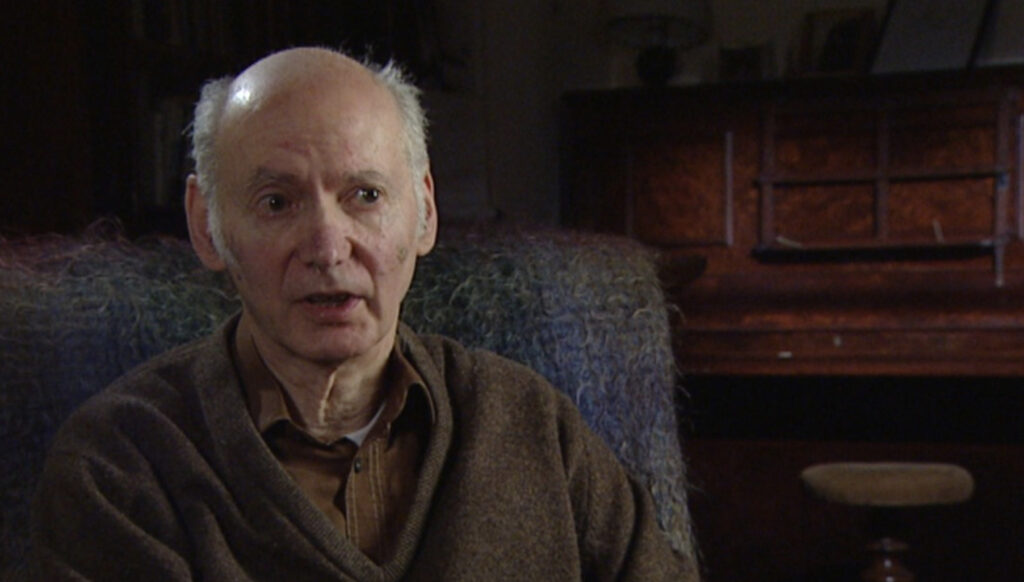
Ted Hall in A COMPASSIONATE SPY, a Magnolia Pictures release. Photo courtesy of Magnolia Pictures.
Q: This story is not just about the danger of a nuclear weapon, but at the same time, it’s also about tackling the subject with technology and pushing ourselves to what we call better life and warning, including adapting the life of A.I. What’s your take on that?
SJ: I think that the creation of the bomb, and what happened subsequently, is an example of technology running rampant. A lot of times, technological advances happen in a way that are perceived, at least initially, as totally positive. That’s why someone like Oppenheimer, who led the effort at Los Alamos could convince himself that by creating and developing this bomb they could bring an end to warfare everywhere, because the notion of warfare would be so abhorrent that humanity would back away from it.
Well, that was incredibly naive, but that’s often what happens with technology that we convince ourselves of its positive influences while blinding ourselves to its potential negative ones which are real. And I’ve seen that happen over and over. It happened with the bomb. It’s happened with all kinds of things in this world related to climate change. And it’s happening right now with AI, at least there’s a big conversation going on about it now. But for 70 years AI was developed without any conversation whatsoever.
Q: Ted Hall and the Saville Sax discussed the prospect of getting interrogated prior to their getting arrested. I was really fascinated by how well prepared they were. It must be daunting, they put them together in the next room with each other. talk about that like how well prepared they are to prospect of getting interrogated by the FBI.
S.J: What happened was that eventually US intelligence broke the Soviets World War II code that was considered unbreakable. When they broke it, they were able to see all kinds of transmissions and they could see that there had been this spy at Los Alamos. It didn’t take them long to figure out that it was Ted Hall. So, in 1951, the FBI in Chicago where Ted was living with Joan, came calling and brought him in for an interrogation with the hope that they could break him and get him to admit to what he’d done.
They needed more evidence than these cables in order to convict him. But Ted had foreseen that this day might come. He handled it with a steely resolve and refused to cooperate with the FBI. Eventually, as we show in the film, he walked out of the meeting with the FBI, sort of daring them to arrest him if they really had anything — which they didn’t.
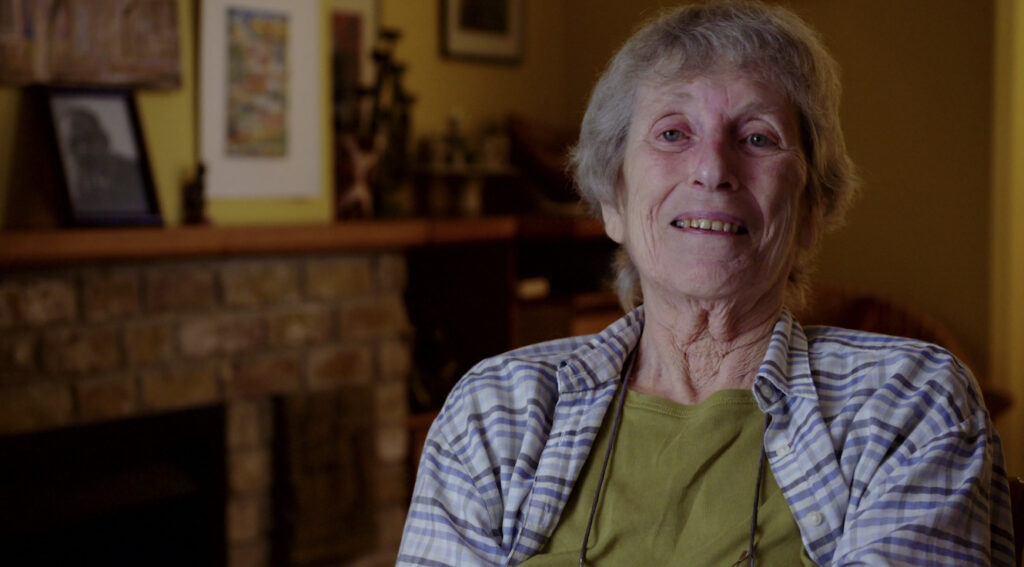
Joan Hall in A COMPASSIONTE SPY, a Magnolia Pictures release. Photo courtesy of Magnolia Pictures.
Q: What did Ted and Joan go through in their minds when Julius and Ethel Rosenberg were executed?
S.J: It was scary for them because Ted looked at Julius Rosenberg and even though at the time, there was all this debate about whether Julius Rosenberg was innocent or guilty, Ted could tell from the newspaper accounts and such that he probably was guilty. But at the same time, Ted also knew that what Julius Rosenberg had done was really not significant compared to what he himself had done.
As you learn in the film, he wanted to come forward and confess in hopes of saving the Rosenbergs. Of course, Joan wisely told him, you can’t save the Rosenbergs. All you’ll do is destroy us if you come forward and admit to what you did. Which is true. So, I think, for both Joan and Ted, the Rosenbergs stood as a palpable example of the danger they had been living with and the potential cost to them should Ted be arrested and convicted. He very well would likely be put to death.
Q: I was surprised to hear about Dwight D. Eisenhower’s letter. He said in the letter that at that time, Japan was seeking surrender so dropping the bomb was completely unnecessary. To look at it from a Japanese perspective, what could have been done knowing this situation, it’s just devastating to think of. Knowing that, he talked about this, right?
S.J: It’s infuriating and beyond the pale. Again, to be fair historians debate that to this day about whether the US made a wise decision. But I’ve read both sides of those debates and I believe that the evidence is clear that dropping the bomb was not at all necessary. Japan was reeling and was in fact looking for a way out and this is something we made clear in the film for the United States.
The bomb wasn’t really about subduing Japan — it was about subduing the Soviet Union in a post-war world. It was clear to the military all the way up to the president that the real purpose of this bomb was for after World War II, not to end World War II. They wanted the world, particularly the Soviet Union, to see an example of the power of this bomb and the devastation that it could cause. And that couldn’t be shown by a test blast in the desert. They wanted to drop bombs on human populations and cities to see what the level of damage would be.
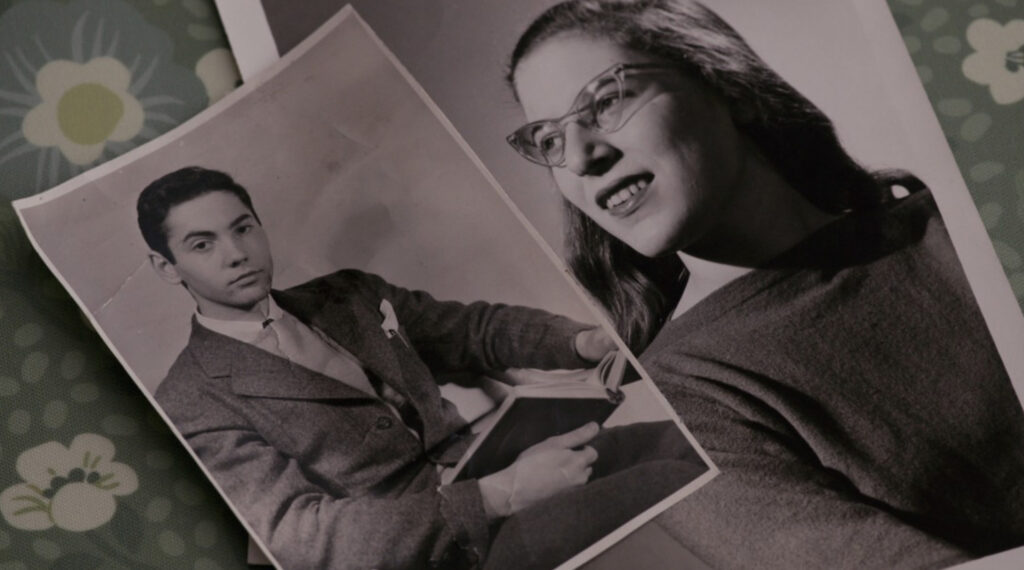
Ted Hall and Joan Hall in A COMPASSIONATE SPY, a Magnolia Pictures release. Photo courtesy of Magnolia Pictures.
Q: A large group of physicists from the Manhattan Project wrote a letter to Truman. They didn’t sign up for them to be dropping the bomb in Hiroshima and Nagasaki. Obviously what they said in the movie was that this letter wasn’t actually sent to Truman. So obviously he didn’t read that.
S.J: Here’s what I believe. Even if [Secretary] Leslie Groves had passed on that letter signed by 70 some scientists to Truman, Truman was going to drop the bomb anyway. I don’t think that would have meant a bit of difference to him that these scientists were saying, please don’t do it because they [Truman and the government] had other reasons for dropping this bomb as we’ve just been talking about. Truman met Oppenheimer — this is in the Oppenheimer movie and is a true story — after all of this had [happened].
He had him to the White House and was sort of complimenting and thanking him for his service. Oppenheimer told Truman that he felt like he had the blood of so many people on his hands, meaning the Japanese people who had died [in the atomic bomb blast]. Truman was very dismissive of him and called him a cry baby. He was not impressed at all with his conscience rearing up and giving him a problem at this point.
Q: When you study history in the US, there are a lot of elements cut out about the bombing of Hiroshima and Nagasaki, it’s the same thing with the Nanking massacre in Japan — how they weren’t told anything about in Japan. Could you talk about getting access to the footage of victims in Hiroshima and Nagasaki?
S.J : It was important for us to have it in this film. We [wanted to present that to] the audience — particularly younger people who are not exposed at all to that. I think in their history, certainly not the imagery of it but to give people, as painful as it is to see, some of the devastation that was wrought by these bombs. Also, to put it in the context of the way in which it was presented to the American people.
You see Truman come on and say, “We bombed a military installation, not a population center, which was a complete lie.” You see how giddy he was when he wasn’t actually speaking on camera. I think all these things were, are, important, particularly for American audiences to see. It’s too easy to think that that was ancient history and that, “Yeah, we had to do it. It was terrible, but we had to do it because we had no choice.” This film is clearly making the case that we very much had a choice.
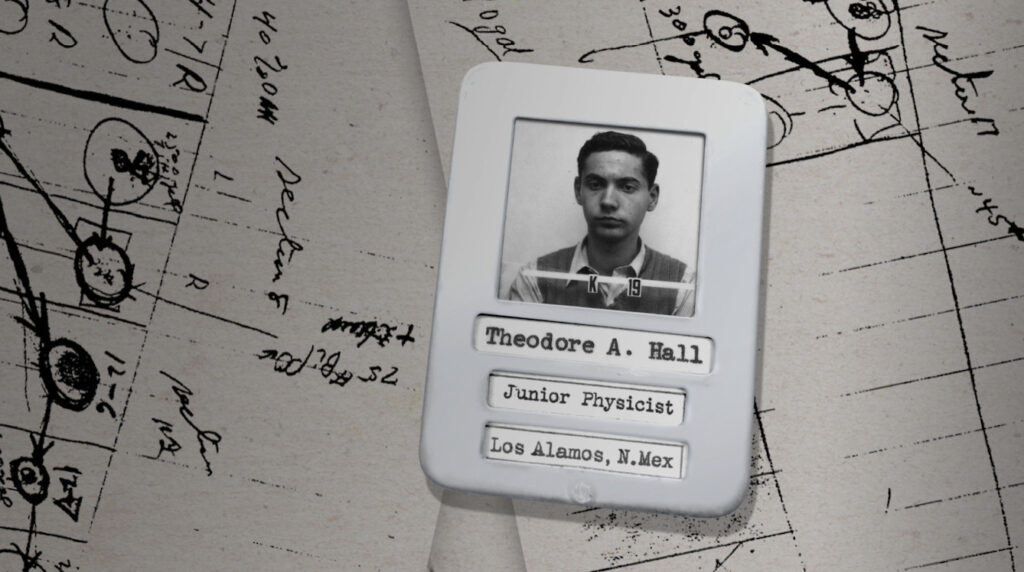
Ted Hall in A COMPASSIONATE SPY, a Magnolia Pictures release. Photo courtesy of Magnolia Pictures.
Check out more of Nobuhiro’s articles.

